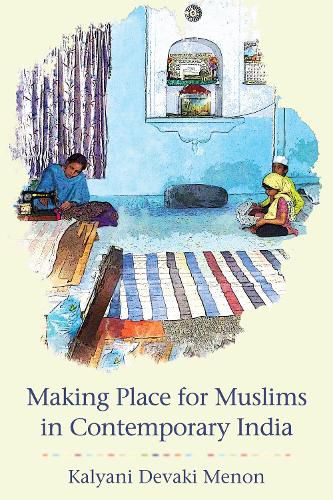Readings Newsletter
Become a Readings Member to make your shopping experience even easier.
Sign in or sign up for free!
You’re not far away from qualifying for FREE standard shipping within Australia
You’ve qualified for FREE standard shipping within Australia
The cart is loading…






Making Place for Muslims in Contemporary India looks at how religion provides an arena to make place and challenge the majoritarian, exclusionary, and introverted tendencies of contemporary India.
Places do not simply exist. They are made and remade by the acts of individuals and communities at particular historical moments. In India today, the place for Muslims is shrinking as the revanchist Hindu Right increasingly realizes its vision of a Hindu nation. Religion enables Muslims to re-envision India as a different kind of place, one to which they unquestionably belong. Analyzing the religious narratives, practices, and constructions of religious subjectivity of diverse groups of Muslims in Old Delhi, Kalyani Devaki Menon reveals the ways in which Muslims variously contest the insular and singular understandings of nation that dominate the sociopolitical landscape of the country and make place for themselves. Menon shows how religion is concerned not just with the divine and transcendental but also with the anxieties and aspirations of people living amid violence, exclusion, and differential citizenship. Ultimately, Making Place for Muslims in Contemporary India allows us to understand religious acts, narratives, and constructions of self and belonging as material forces, as forms of the political that can make room for individuals, communities, and alternative imaginings in a world besieged by increasingly xenophobic understandings of nation and place.
$9.00 standard shipping within Australia
FREE standard shipping within Australia for orders over $100.00
Express & International shipping calculated at checkout
Making Place for Muslims in Contemporary India looks at how religion provides an arena to make place and challenge the majoritarian, exclusionary, and introverted tendencies of contemporary India.
Places do not simply exist. They are made and remade by the acts of individuals and communities at particular historical moments. In India today, the place for Muslims is shrinking as the revanchist Hindu Right increasingly realizes its vision of a Hindu nation. Religion enables Muslims to re-envision India as a different kind of place, one to which they unquestionably belong. Analyzing the religious narratives, practices, and constructions of religious subjectivity of diverse groups of Muslims in Old Delhi, Kalyani Devaki Menon reveals the ways in which Muslims variously contest the insular and singular understandings of nation that dominate the sociopolitical landscape of the country and make place for themselves. Menon shows how religion is concerned not just with the divine and transcendental but also with the anxieties and aspirations of people living amid violence, exclusion, and differential citizenship. Ultimately, Making Place for Muslims in Contemporary India allows us to understand religious acts, narratives, and constructions of self and belonging as material forces, as forms of the political that can make room for individuals, communities, and alternative imaginings in a world besieged by increasingly xenophobic understandings of nation and place.